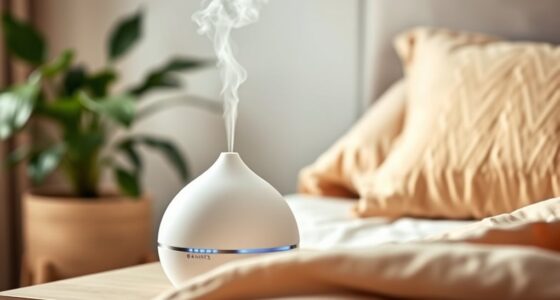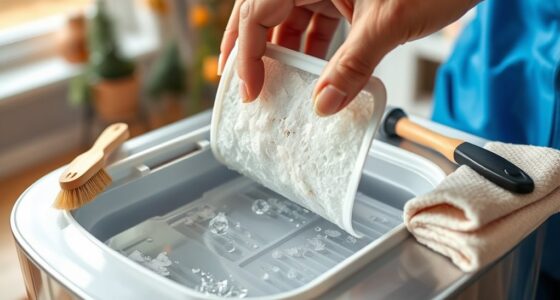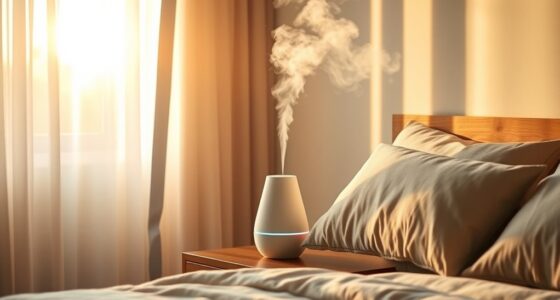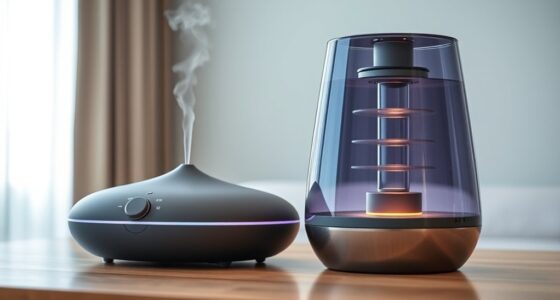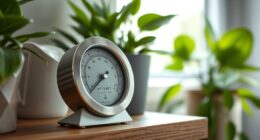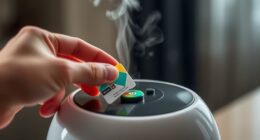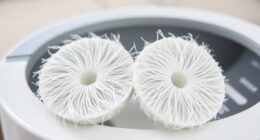Humidifiers can improve your indoor air quality by adding moisture, reducing allergens, and preventing mold. When using essential oils, choose models designed for oils or those with resistant filters, and add oils carefully in small amounts to avoid damage. Always monitor for reactions like respiratory discomfort or skin irritation, and clean your device regularly. For safe, effective aromatherapy, consider proper methods and alternatives—more helpful tips are just ahead.
Key Takeaways
- Using compatible humidifiers with essential oils can improve indoor air quality and promote relaxation safely.
- Select models designed for oil use, such as warm-mist or evaporative types, to prevent damage and ensure proper dispersion.
- Proper dilution and avoiding ultrasonic models not labeled for oils help prevent mold, bacteria, and component damage.
- Monitor for allergic reactions or respiratory symptoms, and discontinue use if adverse effects occur.
- Regular cleaning and following manufacturer guidelines ensure safe, effective aromatherapy benefits.
How Humidifiers Enhance Indoor Air Quality

Humidifiers play a crucial role in improving indoor air quality by adding moisture to dry environments. They support air purification by reducing airborne irritants like dust and allergens, making the air safer to breathe. Maintaining a proper humidification balance is essential; too little moisture worsens dryness, while too much promotes mold growth and dust mites. When used correctly, humidifiers help keep your indoor air cleaner and more comfortable. They prevent static electricity and soothe respiratory symptoms caused by dry air. By maintaining ideal humidity levels, you enhance overall air quality, creating a healthier living space. Proper operation and regular cleaning ensure that your humidifier effectively contributes to a balanced, purified environment without introducing contaminants. Additionally, choosing the right type of humidifier can help optimize performance and further improve air quality.
The Therapeutic Benefits of Essential Oils in Your Home
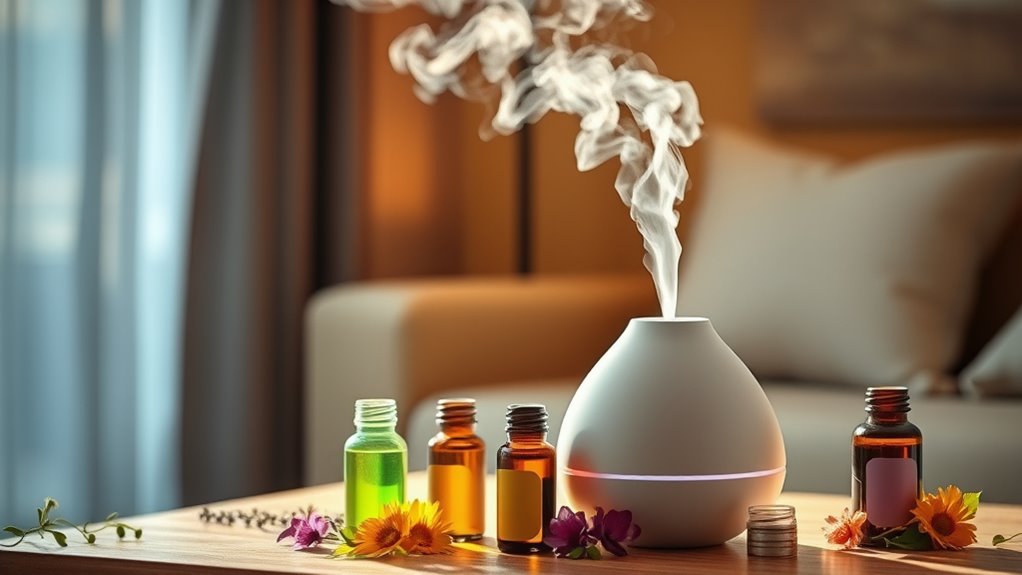
Essential oils have gained popularity for their ability to promote relaxation, boost mood, and support overall well-being in your home. Their aromatherapy benefits are well-known, making them a popular choice for home scenting. When diffused through a humidifier, these oils can create a calming atmosphere, reduce stress, and improve sleep quality. The scenting experience goes beyond just pleasing aromas; certain oils like lavender or eucalyptus can also help clear your sinuses and ease respiratory issues. Incorporating essential oils into your environment allows you to harness their natural therapeutic properties in a simple, effective way. Using dilution guidelines ensures safe and effective use of essential oils in your humidifier. By using a humidifier with essential oils, you enhance your space’s ambiance while promoting mental clarity and physical health. It’s a natural way to support your well-being daily.
Choosing the Right Humidifier for Use With Oils
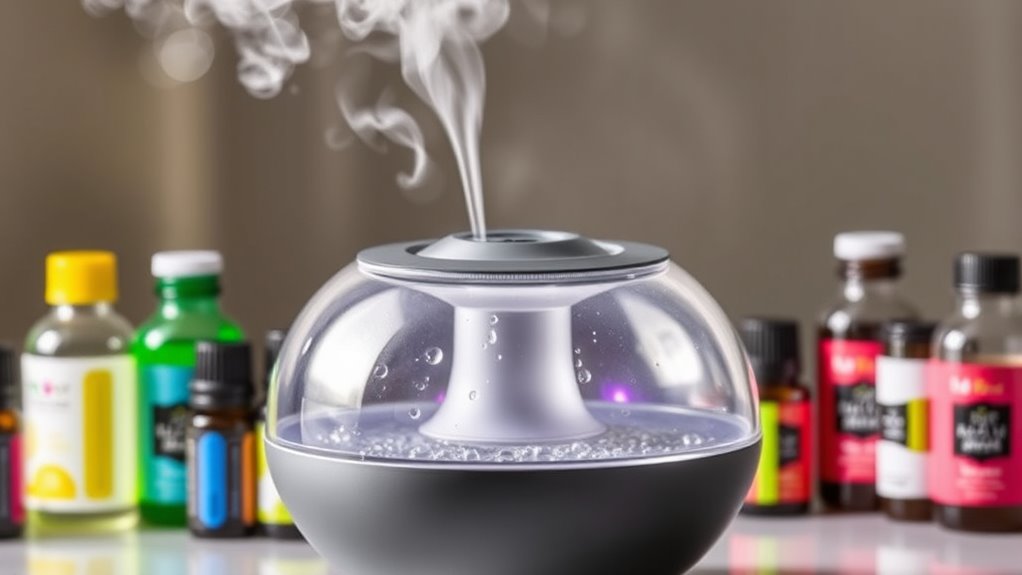
Choosing the right humidifier for use with oils guarantees you get the full therapeutic and aromatic benefits without damaging your device. Start by considering filter selection—opt for models with filters that are easy to clean and resistant to oil buildup, ensuring longevity and hygiene. Oil compatibility is equally important; select a humidifier specifically designed or recommended for essential oils, as some models can be damaged or clogged by oils not intended for use. Avoid ultrasonic humidifiers not labeled for oil use, as oils can damage their components. Instead, opt for warm-mist or evaporative models that are compatible with oils. By carefully choosing a humidifier with the right filter and oil compatibility, you ensure safe, effective diffusion of your essential oils. Incorporating sound design principles can also enhance your aromatherapy experience by creating a calming environment.
Safe Methods for Adding Essential Oils to Your Humidifier
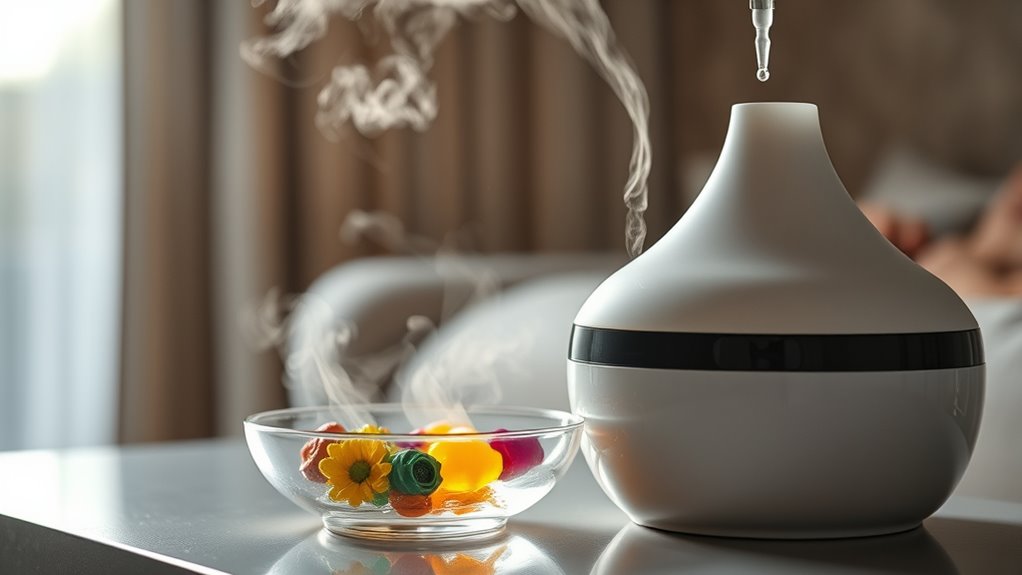
To guarantee safe and effective use, it’s important to add essential oils to your humidifier properly. Start by choosing high-quality, pure essential oil blends suited for humidifier use. Never pour undiluted oils directly into the water tank, as this can damage the device and cause health issues. Instead, add a few drops of essential oil to the water, allowing the diffuser to disperse the scent safely. Proper diffuser placement is key—avoid placing your humidifier near vents, direct sunlight, or areas with high traffic to prevent accidental spills or overexposure. Keep the humidifier on a stable, flat surface and ensure it’s out of reach of children and pets. Additionally, selecting oils with antibacterial properties can help enhance indoor air quality and support a healthier environment. Following these steps helps maximize benefits while minimizing risks.
Potential Risks of Using Essential Oils in Humidifiers

While adding essential oils to your humidifier can offer pleasant scents and potential health benefits, it also poses certain risks if not done carefully. First, essential oil allergies can develop or worsen, causing respiratory issues or skin irritations. Second, people with chemical sensitivities might experience headaches, dizziness, or breathing difficulties from airborne oils. Third, improper use can damage your humidifier’s components, leading to mold or bacterial growth. Additionally, diffusing oils in a humidifier may spread concentrated particles unevenly, increasing the risk of adverse reactions. If you have allergies or sensitivities, it’s vital to use pure, diluted oils and monitor your response. Always research specific oils for safety and consult a healthcare professional if unsure. Furthermore, AI-driven data analytics in some smart humidifiers can help detect and prevent overuse or potential health hazards associated with oil diffusion.
Recognizing and Preventing Mold and Bacteria Growth
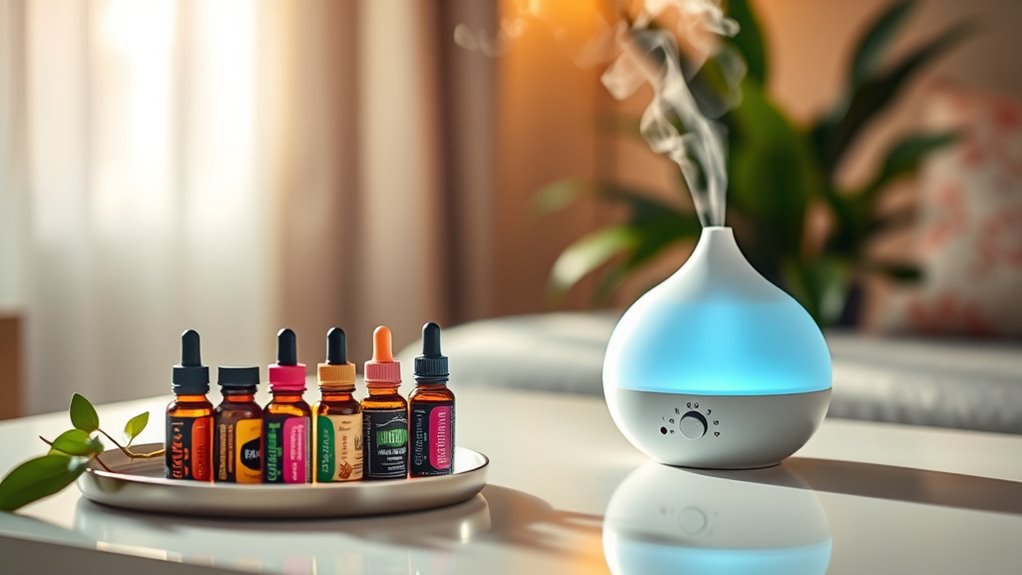
Mold and bacteria can quickly develop in a humidifier if you don’t take proper precautions, posing health risks such as allergies and respiratory infections. To prevent this, regularly clean your device, replace humidifier filters, and use distilled water. Mold and bacteria thrive in damp environments, releasing airborne allergens that can worsen breathing issues. Keep an eye out for visible mold or slimy deposits inside the tank. Use a disinfectant solution periodically to kill germs. Proper maintenance minimizes the growth of mold and bacteria, safeguarding your air quality. Regularly inspecting the humidifier and understanding humidity levels can help maintain a healthy environment. Here’s a quick guide:
| Action | Frequency | Purpose |
|---|---|---|
| Clean humidifier | Weekly | Prevent mold buildup |
| Replace filters | Monthly | Reduce airborne allergens |
| Use distilled water | Every refill | Minimize bacteria growth |
| Inspect for mold | Regularly | Detect early signs |
Tips for Proper Maintenance and Cleaning
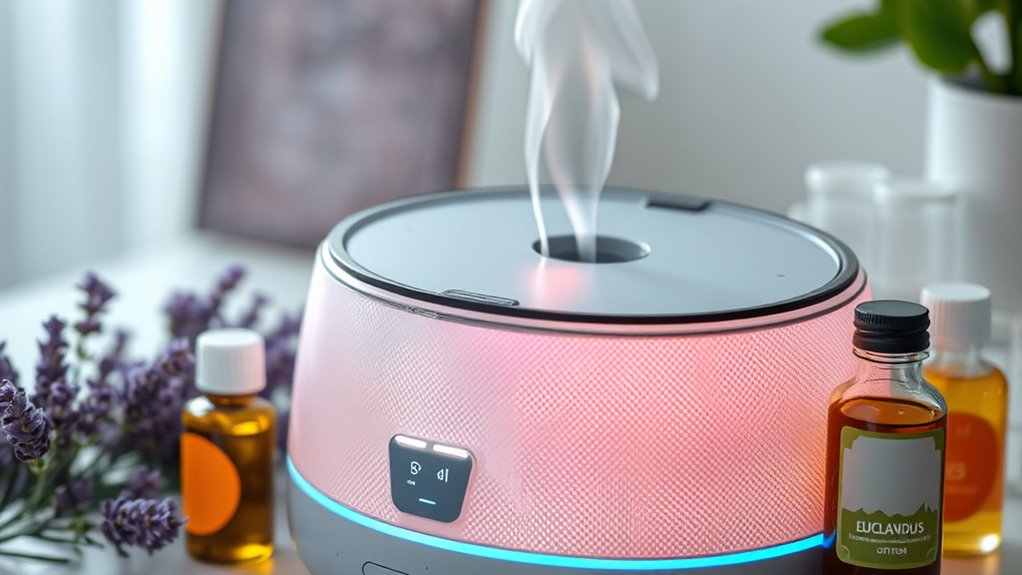
Maintaining your humidifier properly guarantees it operates efficiently and stays free of harmful germs. Regular cleaning prevents mold buildup and ensures safe use, especially when using essential oils. Follow these tips to keep it in top shape:
- Adhere to a cleaning schedule—at least once a week, empty, rinse, and disinfect the tank with vinegar or a mild cleaner.
- Replace filters regularly—check manufacturer guidelines for filter replacement intervals and avoid neglecting filter maintenance.
- Clean all components—including the humidifier’s base, water reservoir, and any removable parts, to prevent mineral deposits and bacterial growth.
Sticking to these steps helps your humidifier function properly, extends its lifespan, and keeps the air healthy for you and your loved ones.
Identifying Signs of Adverse Reactions or Sensitivities
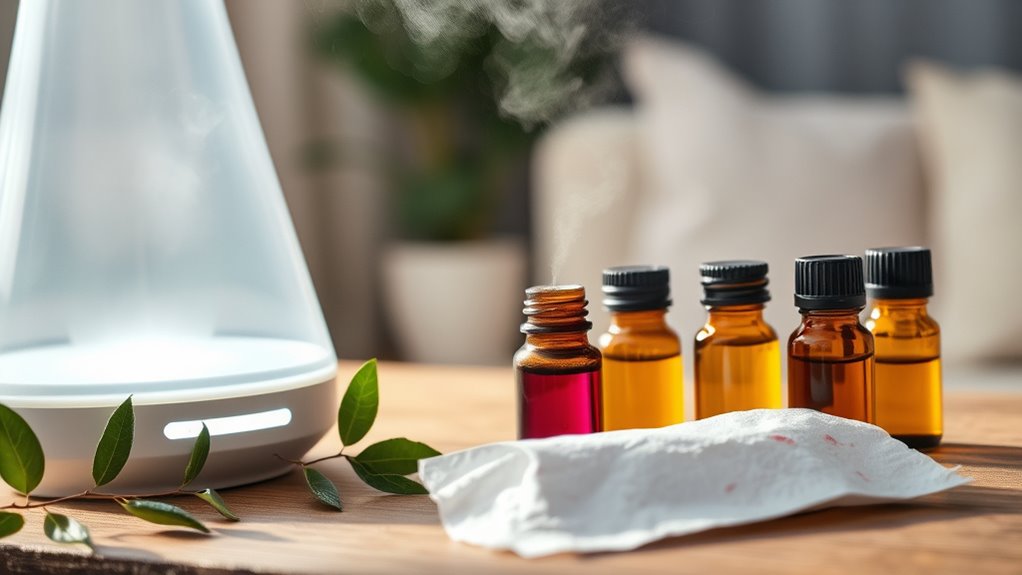
Even with proper cleaning, using a humidifier with essential oils can sometimes cause adverse reactions or sensitivities. You should watch for allergy symptoms such as sneezing, nasal congestion, or itchy eyes, which may indicate a reaction to certain oils. Skin irritation is another sign; if your skin becomes red, itchy, or develops a rash after exposure, it could be a sensitivity. Pay attention to any persistent coughing or difficulty breathing, as these could signal an allergic response. Discontinue use immediately if you notice any of these symptoms and consult a healthcare professional. Recognizing these signs early helps prevent more serious reactions and ensures you use essential oils safely in your humidifier. Additionally, understanding the specific essential oils for respiratory health can help you choose options less likely to cause sensitivities.
Alternatives to Diffusing Essential Oils With Humidifiers
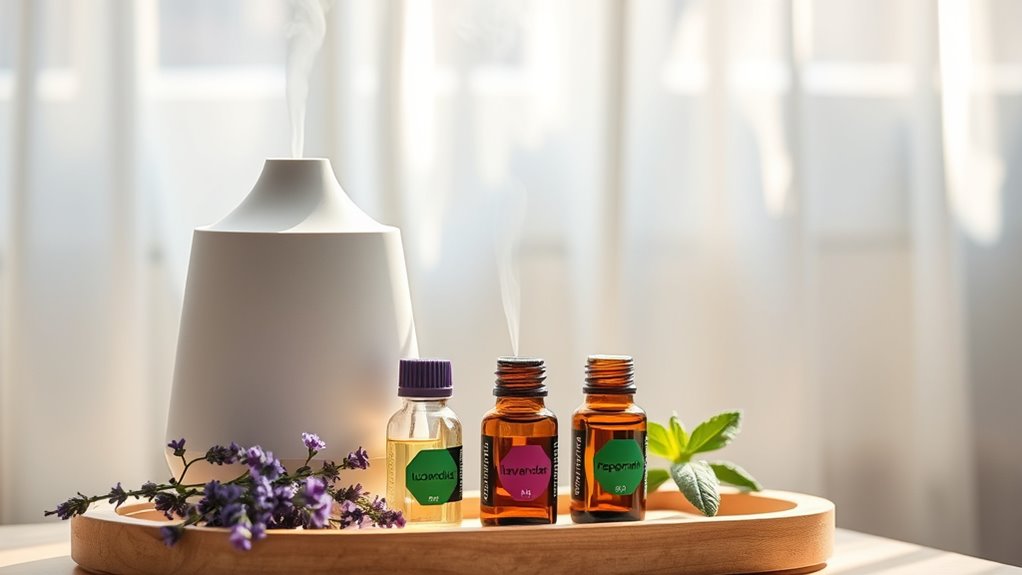
If you want to enjoy the benefits of essential oils without using a humidifier, there are effective alternatives. You can try creating essential oil mists or using standalone diffusers designed specifically for oils. These options let you enjoy aromatherapy safely and conveniently. Additionally, always ensure proper dilution and safety measures when applying essential oils directly to the skin or using them in other methods.
Using Essential Oil Mists
Have you considered using essential oil mists as a natural alternative to diffusing oils with your humidifier? These mists allow you to enjoy aromatherapy safety while controlling the scent intensity. Here’s what you can do:
- Use a dedicated spray bottle to create a fine mist of diluted essential oils, ensuring proper essential oil blending for safe inhalation.
- Mist the air around your space, rather than directly on surfaces or fabrics, to prevent any potential residue or damage.
- Combine soothing oils like lavender or eucalyptus for calming effects, but always test blends to avoid skin or respiratory irritation.
- Recognizing angel number soulmate signs can help you tune into love opportunities that may also enhance your emotional well-being during aromatherapy practices.
Using essential oil mists offers a versatile way to enjoy aromatherapy benefits without overloading your humidifier or risking improper diffusion.
Essential Oil Diffuser Alternatives
While using essential oil mists offers a flexible way to enjoy aromatherapy without overloading your humidifier, there are also other alternatives to diffuse essential oils effectively. You can create DIY blends by adding a few drops of essential oils to a cotton ball or cloth placed near your vent or in a diffuser bowl. Another option is to use an essential oil diffuser designed specifically for direct application, which minimizes the risk of over-saturating your humidifier. Proper oil storage is vital to maintain scent integrity and prevent spills—store oils in dark, airtight bottles away from heat. These alternatives give you control over dispersion, helping you enjoy the benefits of essential oils safely without risking damage to your humidifier or overexposure. Additionally, choosing the right aromatherapy method can enhance your experience and safety.
Best Practices for Creating a Calm and Safe Environment

Creating a calm and safe environment with humidifiers and essential oils requires careful attention to placement and usage. To maximize aromatherapy benefits and guarantee humidifier safety, keep these tips in mind:
- Place your humidifier on a flat, elevated surface away from electronics and direct sunlight to prevent water damage and mold growth.
- Use high-quality essential oils in moderation, avoiding those that may irritate your skin or respiratory system, and always follow manufacturer guidelines.
- Regularly clean your humidifier to prevent bacteria and mold buildup, ensuring a safe, healthy environment free from potential hazards.
- Be aware of fathers’ influence on creating a nurturing space, emphasizing the importance of a safe environment for loved ones.
Frequently Asked Questions
Can Essential Oils Damage My Humidifier’S Components Over Time?
You might wonder if essential oils can damage your humidifier’s components over time. While some oils aren’t compatible with certain models, improper use can cause buildup or corrosion. To prevent this, always check your humidifier’s manual for essential oil compatibility and stick to regular humidifier maintenance. Using oils sparingly and cleaning your device regularly helps protect it from potential damage, ensuring it lasts longer and works efficiently.
Are There Specific Oils That Are Safer for Children or Pets?
Remember, safety first is the best policy. When choosing essential oils for children or pets, opt for child-safe oils like chamomile or lavender, which are gentle and calming. For pets, look for pet-friendly options such as cedarwood or frankincense. Always dilute oils properly and consult a veterinarian or pediatrician before use. This way, you guarantee a safe environment, keeping everyone happy and healthy.
How Do I Identify if My Essential Oils Are of Therapeutic Grade?
To identify if your essential oils are therapeutic grade, look for quality assurance labels from reputable sources. Reputable brands often provide transparency about their testing for oil purity and purity standards. Check if the product has third-party testing or certifications, which ensure the oil meets high purity standards. Avoid oils with synthetic additives or unclear sourcing. This helps you confidently choose oils that are safe and effective for your needs.
What Are the Environmental Impacts of Using Essential Oils in Humidifiers?
You might wonder about the environmental impacts of using essential oils in humidifiers. When you choose eco-friendly practices, you reduce air quality concerns by avoiding synthetic fragrances or harmful chemicals. Using pure, sustainably sourced oils minimizes ecological harm and supports air quality. However, excessive use can lead to oil residue buildup, affecting air purity. To stay environmentally conscious, limit oil use and opt for high-quality, natural options.
Can Using Essential Oils Worsen Respiratory Conditions in Some Individuals?
Using essential oils can worsen respiratory conditions for some people, especially those with respiratory sensitivity or oil allergies. You might experience irritation, coughing, or difficulty breathing if your respiratory system reacts badly. If you have existing issues, it’s best to test a small amount first or consult a healthcare professional before using oils. Always monitor your symptoms and discontinue use if you notice any adverse reactions.
Conclusion
By understanding how humidifiers and essential oils work together, you create a healthier, more calming environment at home. When you choose the right device, add oils safely, and stay attentive to your body’s reactions, you might find that your space naturally becomes more soothing. Sometimes, a simple mist infused with calming scents can unexpectedly lift your mood or ease your stress. Keep safety in mind, and let your home’s atmosphere gently transform—sometimes, it’s the small changes that make the biggest difference.


